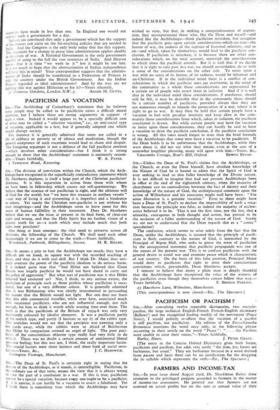Sta,--The Dean of St. Paul's is certainly right in saying
that the dictum of the Archbishops, as it stands, is unintelligible. Pacificism, in the ordinary use of that term, means the view that it is always wrong to take the part of a combatant in a war. If this is true, pacificism cannot be a special vocation, because eviary one ought to be a pacificist; if it is untrue, it can hardly be a vocation to assert a falsehood. Yet I think there is something true which the Archbishops may have wished to state, but that, in seeking a compendiousness of expres- sion, they misrepresented those who, like the Dean and myself—and indeed like the Archbishops—think pacificism mistaken, but recognise that the pacificist goes upon certain considerations which are true—the horror of war, the sadness of the rupture of fraternal relations, and so on—and which, taken by themselves, would lead to the pacificist con- clusion. If pacificism is mistaken, it is because there are other con- siderations which, on the total account, outweigh the considerations to which alone the pacificist attends. But it is well that if we decide that it is right to take part in a war, we should nevertheless do so with a sense of the considerations on the other side. To enter upon a war with no sense of its horror, of its sadness, would be inhuman and un-Christian. If in the individual mind there is a conflict of con- siderations in which the pacificist ones are overborne, in the mind of the community as a whole those considerations are represented by a certain set of people who assert them in isolation And if it is well that in the individual mind these considerations, if overborne, should still be felt, it may be desirable that in the community there should be a certain number of pacificists, provided always that they are not numerous enough to impede the prosecution of a war, where it is right to go to war. It may then be held that certain people have a vocation to feel with peculiar intensity and keep alive in the com- munity those considerations from which, taken in isolation, the pacificist conclusion is drawn. But while certain people may have the vocation to insist upon those considerations, they can hardly be said to have a vocation to draw the pacificist conclusion, if the pacificist conclusion is wrong. All this takes much longer to state than the brief formula of the Archbishops that some men have a vocation to be pacificists. If the Dean holds it to be unfortunate that the Archbishops, while they were about it, did not say what they meant, even at the cost of a somewhat lengthier phrasing, many will agree with him.—Yours, &c., Yatscombe Cottage, Boar's Hill, Oxford. EDwYN BEVAN.


























 Previous page
Previous page